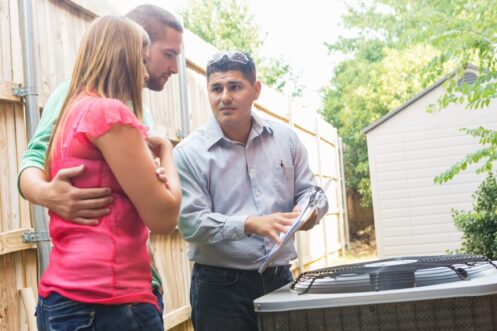4 Ways High Humidity Affects Charlotte Cooling Systems

When you live in Charlotte, NC, the air tends to be humid during the summer. This affects not only the air outside but also the air inside your home. High humidity levels can increase cooling costs and system strain or even cause indoor air quality issues. This article will explore four ways that humidity can affect your home’s cooling system and how to solve the problem.
1. Humidity Makes it Harder For Your AC to Keep Your Home Cool
When humidity is high, your air conditioner has to work harder because the air retains heat longer. Many homeowners lower the thermostat, thinking their AC isn’t cooling properly, but this only increases energy use without solving the issue. Using a dehumidifier alongside your AC can help maintain consistent comfort while reducing cooling costs.
A professional can install a whole-home dehumidifier by integrating it into your existing HVAC system. The dehumidifier is typically connected to the return air duct, where it removes excess moisture before the air is cooled and distributed throughout your home. The collected water is then drained away through a condensate line. A technician will ensure the unit is properly sized for your home’s needs and calibrated to maintain ideal humidity levels, usually between 30% and 50%.
2. Uneven Cooling
Since humid air holds onto heat longer, rooms in your home that do not get enough conditioned air will be warmer. Make sure that all the supply and return vents in your house are in the fully open position and not blocked by household items like furniture, area rugs, and drapes. This will ensure proper airflow and reduce hot and cold spots. You can also use ceiling fans to improve air circulation.
In summer, adjust them so that they rotate counterclockwise, creating a downdraft that helps distribute cool air more evenly. If certain rooms remain warmer despite these adjustments, your HVAC system may need balancing or ductwork improvements to ensure consistent cooling throughout your home.
3. Mildew and Mold Growth
A cooling system with poor humidity control creates the ideal conditions for mold growth. Mold and mildew can grow in your ducts, where it isn’t easy to see before the spores have the chance to circulate throughout the air in your home. Some signs of this issue include musty odors, visible mold near vents, or household members experiencing increased allergy symptoms.
Installing a whole home humidity control system can solve the root cause behind this humidity problem. However, you should also have your ducts cleaned. HVAC professionals clean ductwork using specialized equipment to remove mold, dust, and other contaminants. The process typically begins with an inspection using cameras or scopes to assess the extent of the buildup. Then, they use powerful vacuums and rotary brushes to dislodge debris from the ducts. In cases of mold growth, they may apply EPA-approved antimicrobial treatments to eliminate spores and prevent regrowth.
4. Water Pooling Around Your Air Conditioner
High humidity levels can lead to water pooling around your air conditioner, often signaling an issue with the system’s ability to drain condensation properly. Your AC removes humidity as it cools the air, and the moisture collects in a drip pan before draining through a condensate line. However, when humidity is high, the system must work harder, increasing the condensation it produces. If the drain line becomes clogged with algae, dirt, or debris, water can back up and overflow, leading to puddles around your indoor or outdoor unit.
Another possible cause is a frozen evaporator coil, which can occur due to dirt buildup or low refrigerant levels. When the ice melts, it can overwhelm the drip pan, causing water to pool.
Scheduling an AC tune-up can help prevent these issues. During a maintenance visit, a technician will inspect and clean the condensate drain line, check the drip pan for cracks or leaks, and ensure proper airflow through the coils to prevent freezing. They will also check refrigerant levels and system components to make sure your AC is running efficiently. Keeping up with regular maintenance reduces the risk of water damage and helps your cooling system perform at its best during Charlotte’s humid summers.
Contact Your Local AC Pros
At Integrity Heating & Cooling, we have served the residents of Charlotte, NC and the surrounding areas for over 35 years. We install, maintain, and repair air conditioners. You can also count on us for all your humidity control and indoor air quality needs. Contact us today to schedule an appointment with one of our experienced technicians.
Tags: AC Maintenance, dehumidifiers, indoor air quality tips

